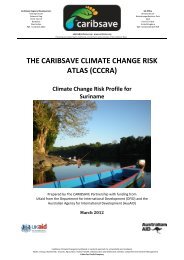Create successful ePaper yourself
Turn your PDF publications into a flip-book with our unique Google optimized e-Paper software.
damages from intense climatic conditions have cost the region in excess of half a trillion US dollars (CCCCC,<br />
2009).<br />
1.1. Climate Change Impacts on Tourism<br />
Direct <strong>and</strong> indirect climatic impacts: The Caribbean’s tourism resources, the primary one being the climate<br />
itself, are all climate sensitive. When beaches <strong>and</strong> other natural resources undergo negatives changes as a<br />
result of climate <strong>and</strong> meteorological events, this can affect the appeal of a destination – particularly if these<br />
systems are slow to recover. Further, studies indicate that a shift of attractive climatic conditions for<br />
tourism towards higher latitudes <strong>and</strong> altitudes is very likely as a result of climate change. Projected<br />
increases in the frequency or magnitude of certain weather <strong>and</strong> climate extremes (e.g. heat waves,<br />
droughts, floods, tropical cyclones) as a result of projected climate change will affect the tourism industry<br />
through increased infrastructure damage, additional emergency preparedness requirements, higher<br />
operating expenses (e.g. insurance, backup water <strong>and</strong> power systems, <strong>and</strong> evacuations), <strong>and</strong> business<br />
interruptions (Simpson, Gossling, & Scott, 2008).<br />
In contrast to the varied impacts of a changed climate on tourism, the indirect effects of climate-induced<br />
environmental change are likely to be largely negative.<br />
Impacts of mitigation policies on tourist mobility: Scientifically, there is general consensus that ‘serious’<br />
climate policy will be paramount in the transformation of tourism towards becoming climatically<br />
sustainable, as significant technological innovation <strong>and</strong> behavioural change dem<strong>and</strong> strong regulatory<br />
environments (e.g. Barr et al, 2010; Bows, Anderson, & Footitt, 2009; Hickman & Banister, 2007; Giddens,<br />
2009). As outlined by Scott, Peeters, & Gössling (2010), “serious” would include the endorsement of<br />
national <strong>and</strong> international mitigation policies by tourism stakeholders, a global closed emission trading<br />
scheme for aviation <strong>and</strong> shipping, the introduction of significant <strong>and</strong> constantly rising carbon taxes on fossil<br />
fuels, incentives for low-carbon technologies <strong>and</strong> transport infrastructure, <strong>and</strong> ultimately, the development<br />
of a vision for a fundamentally different global tourism economy. The Caribbean is likely to be a casualty of<br />
international mitigation policies that discourage long-haul travel.<br />
Pentelow <strong>and</strong> Scott (2010) concluded that a combination of low carbon price <strong>and</strong> low oil price would have<br />
very little impact on arrivals growth to the Caribbean region through to 2020, with arrivals 1.28% to 1.84%<br />
lower than in the business as usual (BAU) scenario (the range attributed to the price elasticities chosen).<br />
The impact of a high carbon price <strong>and</strong> high oil price scenario was more substantive, with arrivals 2.97% to<br />
4.29% lower than the 2020 BAU scenario depending on the price elasticity value used. The study concluded:<br />
It is important to emphasize that the number of arrivals to the region would still be<br />
projected to grow from between 19.7 million to 19.9 million in 2010 to a range of 30.1<br />
million to 31.0 million in 2020 (Pentelow & Scott, 2010).<br />
Indirect societal change impacts: Climate change is believed to pose a risk to future economic growth of<br />
some nations, particularly for those where losses <strong>and</strong> damages are comparable to a country’s GDP. This<br />
could reduce the means <strong>and</strong> incentive for long-haul travel <strong>and</strong> have negative implications for anticipated<br />
future growth in this sector in the Caribbean. Climate change associated security risks have been identified<br />
in a number of regions where tourism is highly important to local-national economies (e.g. Stern, 2006;<br />
Barnett & Adger, 2007; German Advisory Council, 2007; Simpson, Gossling, & Scott, 2008). International<br />
tourists are averse to political instability <strong>and</strong> social unrest, <strong>and</strong> negative tourism-dem<strong>and</strong> repercussions for<br />
climate change security hotspots, many of which are believed to be in developing nations, are already<br />
evident (Hall, Waugh, Haine, Robbins, & Khatiwala, 2004).<br />
3





